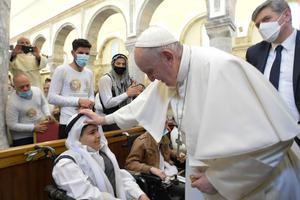Pope’s Visit to Arabian Peninsula ‘a Special Grace’
Such a visit, which featured a papal Mass and the signing of a fraternal Muslim-Catholic joint declaration condemning violence committed in the name of religion, was unthinkable until very recently.

ABU DHABI — Few papal trips have been quite so historically significant, momentous and widely welcomed as Pope Francis’ fleeting 39-hour visit to Abu Dhabi in the United Arab Emirates (UAE).
From the first-ever papal Mass in the Arab Peninsula, the cradle of Islam, to the signing of a Muslim-Catholic declaration underlining brotherhood and condemning all violence in the name of religion, the historic Feb. 3-5 apostolic voyage would have been unthinkable just over a decade ago.
“It was an extremely spiritual experience for many, and I know many were teary-eyed, as they had never expected that Pope Francis would visit the United Arab Emirates,” Bishop Paul Hinder, the apostolic vicar of Southern Arabia, told the Register Feb. 6.
The Swiss-born bishop, who said the visit was a “special grace” after 15 years of episcopal service in the region, said his heart was “warmed” and “overwhelmed” at the welcome the Pope received from some 150,000 people who came to the open-air Mass in Abu Dhabi.
For Pope Francis, “fraternity” was the keyword. The trip, he said, marked a “new page” in the history of dialogue between Christianity and Islam and was meant as a pushback against what Francis called a “strong temptation to see a clash between Christian and Islamic civilizations.”
Providence, the Holy Father said, had wished that a pope called Francis would make the historic journey on the 800th anniversary of St. Francis of Assisi’s visit to Sultan al-Malik al-Kamil.
The Pope and the Vatican principally wanted the visit to be one of peace, reconciliation and dialogue in a country the Holy Father described as a “crossroads between East and West, a multiethnic and multireligious ‘oasis,’ and therefore a place well suited to promoting the culture of encounter.”
For the UAE, whose government has been working toward a papal visit for years, the trip served to underscore their drive to portray an image of tolerance and openness in the Arabian Peninsula, which for centuries was closed to other religions and forbade churches. Today, nearly 1 million Catholics live in the UAE, a country of 9.4 million, and all are immigrants.
Peter Hellyer, an historian and commentator on UAE affairs, said some political and diplomatic calculation was certainly behind the visit, but added that the government had wanted to show the world the scope for developing “real dialogue” between Islam and Christianity and that the UAE has a “positive story to tell” in a region marked by “negative global perceptions of strife.”
He observed “palpable excitement” remained a day after the historic visit, which “continues to be a feature of conversation, not just among the country’s Catholic community, but more widely.” Officials, he said, were “tired but delighted, enthused and satisfied” with the way the visit had gone.
But the trip was not, perhaps predictably, without controversy, particularly around a passage in the declaration on human fraternity, signed by Francis and the grand imam of Al-Azhar University on Feb. 4.
The passage states that the “pluralism and the diversity of religions” are “willed by God.” On the plane back from Abu Dhabi, the Pope stressed the document was written “in the spirit of Vatican II,” and had been checked by the papal theologian.
Informed sources confirm Dominican Father Wojciech Giertych was consulted but did not see the final draft.
The Visit’s Impact
Attention is now turning to the overall impact of the visit. Bishop Hinder said it was “too early” to pinpoint tangible results, but the Pope had left “concrete messages” and a “call to action on how the region can achieve peace,” especially in countries such as nearby war-torn Yemen, which, Bishop Hinder said, need to enact such changes “as soon as possible to avert the humanitarian crises they suffer, such as famine and migration.”
As for the UAE, whose widely hailed tolerance analysts caution should be kept in perspective, the papal visit will have helped the country’s Muslim majority to “become aware” of the “vibrant Christian communities that live amongst them,” according to Hellyer. He also believes the UAE’s rulers have also shown themselves to be “fully committed” to respecting “the country’s diverse faiths,” offering Christians “real assurance for now and for the future.”
Bishop Hinder called the UAE’s organizing of a public papal Mass a “tremendous move” in the face of “security threats and religious discord in the region.”
But full citizenship rights — something still denied to Christian immigrants and other minorities in the UAE and other nations in the Arab Peninsula — remain a thorny issue for the region, even though the joint document on human fraternity called for such rights and an end to the use of the term “minorities,” which, it says, “paves the way for hostility and discord.”
Yet just as many never expected such a visit as this, so the Pope is placing the impact of this “trip of God’s surprises” firmly in the hands of God.
“Let us therefore praise him and his providence,” he told the faithful on his return to Rome, “and let us pray that the seeds sown may bring fruit according to his will.”
Edward Pentin is the Register’s Rome correspondent.


















